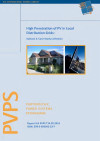Suchergebnisse für "Factsheet%3A Energietechnologien gestalten%2C die f%C3%BCr alle sinnvoll und nutzbar sind"
Ausstellung: Baufamilien-Tag
29. August 2010
1. Europäisches Passivhausdorf zum Probewohnen
3922, Großschönau, AT
Der Sonnenplatz Großschönau veranstaltet am 29. August 2010 einen Baufamilien-Tag. Dieses Mal zum Schwerpunktthema "Wärmepumpe".
IEA SHC TASK 42 / ANNEX 29
Messverfahren zur Charakterisierung der Speicherfähigkeit von Phasenwechselmaterialien (PCM) - Aktuelle Aktivitäten des IEA SHC TASK 42 / ANNEX 29.
Tagung: ecofashion - Mode mit Zukunft!
10. Nov 2009
Tagungszentrum Schönbrunn im Schloss Schönbrunn
Wien, AT
Tagung zum Thema Ökotextilien
Tecnet Preis 2010
Fabrik der Zukunft Maize Cob Board (MCB) Projekt gewinnt den Tecnet Preis 2010
IEA Bioenergy Task 37: Report "Biogas production from kitchen wastes in Jinhua, China" (2021)

Der Report gibt eine Übersicht über ein erfolgreiches Beispiel zur Vergärung von Küchenabfällen in China.
Fang Ming
Herausgeber: IEA Bioenergy Task 37, 2021
Englisch, 4 Seiten
Downloads zur Publikation
Symposium: Plus-Energie-Gebäude
28. November 2011
Prechtlsaal, TU Wien
Wien, AT
Aktuelle Forschungsergebnisse zu Plus-Energie-Gebäuden aus der Programmschiene "Haus der Zukunft Plus"
IEA SHC Task 55: Solar Heat Networks: Policy, Planning, Design and Performance (2019)

Im Bericht wird das Solar Academy Training vorgestellt, das in London am 8. März 2019 abgehalten wurde.
Richard Hall
Herausgeber: IEA SHC, 2019
Englisch, 9 Seiten
Downloads zur Publikation
Info-Veranstaltung: Baufamilien-Tag
31. Mai 2009
1. Europäisches Passivhausdorf zum Probewohnen
3922, Großschönau, AT
Der Sonnenplatz Großschönau veranstaltet am 31. Mai 2009 einen Baufamilien Tag. Dieses Mal zum Schwerpunktthema "Sanierung mit Passivhauskomponenten".
Kongress: 10. schönauer Expertentage 2011
17. - 18. November 2011
Forschungs- und Kompetenzzentrum für Bauen und Energie
Sonnenplatz 1, 3922 Großschönau, AT
Wirtschaft - Innovation - Nachhaltigkeit: Energieeffizienz als globale Herausforderung
Themenworkshop-Reihe "Haus der Zukunft in der Praxis"
"Haus der Zukunft"-Themenworkshops werden zu strategisch wichtigen Fragestellungen veranstaltet. Ziel der Themenworkshops ist, aktuelle Ergebnisse abgeschlossener oder noch laufender Projekte zum gewählten Thema zu präsentieren und mit den Teilnehmer:innen zu diskutieren.
Technological as well as economical optimized Biomass CHP systems with regard to state-of-the-art technologies.
Analysis and presentation of representative biomass CHP systems with an electric power output of less than 2 MW. Variation of parameters and identification of potential optimized interactions between specific units. Identification of the economically and thermodynamically most optimized interconnection based on state-of-the-art technologies.
Ausstellung: Baufamilien-Tag
25. April 2010
Harmannsteinerstraße
3922, Großschönau, AT
Der Sonnenplatz Großschönau veranstaltet am 25. April 2010 einen Baufamilien Tag. Dieses Mal zum Schwerpunktthema "Wärmepumpe".
Themendialog "Sommerkomfort - innovative Gebäudekonzepte"
20. Juni 2011
Kammer der Architekten und Ingenieurkonsulenten, Karlsgasse 9
1040 Wien, AT
Dieses Themenspektrum wird bei der Veranstaltung in vier Fachvorträgen beleuchtet.
19. Symposium Energieinnovation
11. - 13. Februar 2026
Technische Universität Graz, AT
Das Thema der Veranstaltung lautet "ENERGIZING EUROPE - Innovationen für eine zukunftsfähige Energiewirtschaft".
Report "High Penetration PV in local Distribution Grids: Case-Study Collection" (2014)

Im Rahmen von Task 14 wurden Fallstudien zur Netzintegration von Photovoltaik in elektrischen Verteilnetzen erarbeitet. Daten aus 11 Ländern weltweit wurden gesammelt und für eine vergleichende Analyse aufbereitet, welche in diesem Bericht zusammengefasst ist.
Herausgeber: IEA Photovoltaic Power Systems Programme
Englisch, 206 Seiten
Downloads zur Publikation
IEA AFC Annex 31: Performance strategy for efficient cold start of polymer electrolyte fuel cells (2018)

Dieser Bericht befasst sich mit der Darstellung effektiver Betriebsstrategien für PEM Brennstoffzellen. Der Fokus liegt auf der Entwicklung schädigungsarmer Verfahren für Start-Stopp Vorgänge in automobilen Anwendungen.
K. Kocher, V. Hacker
Herausgeber: Technische Universität Graz, CEET
Englisch, 2 Seiten
Info-Veranstaltung: Baufamilien-Tag
25. Juli 2010
1. Europäisches Passivhausdorf zum Probewohnen
3922, Großschönau, AT
Der Sonnenplatz Großschönau veranstaltet am 25. Juli 2010 einen Baufamilien-Tag. Dieses Mal zum Schwerpunktthema "Sanierung mit Passivhauskomponenten".
Ausstellung: Passivhausparcours mit Sanierungsmeile im Rahmen der BIOEM 2010
3. - 6. Juni 2010
BIOEM Großschönau
Großschönau, AT
Auf der 4 tägigen Schau wird ein Passivhausparcours mit Sanierungsmeile errichtet.
IEA EBC Annex 68: Alternative ducting options for balanced mechanical ventilation systems in multifamily housing (2020)

Es wird eine alternative Möglichkeit der Luftkanalführung in der Dämmebene aufgezeigt. Sie erlaubt eine minimal-invasive Nachrüstung von zentralen Wohnraumlüftungsanlagen im Zuge einer thermischen Sanierung.
G. Rojas, R. Pfluger
Herausgeber: Air Infiltration and Ventilation Centre (AIVC), 2020
Englisch, 3 Seiten
Das Klima verändert sich - auch in Österreich (Wien, A)
Donnerstag 7. November 2002, 14:00 Uhr
ORF, Radio Kulturhaus
1040 Wien, Argentinierstraße 30A
Unkonventionelles science event zum Thema Klimawandel
